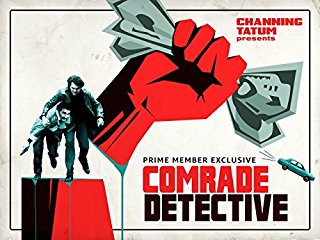Comrade Detective

I’ve become absorbed by Comrade Detective, the new Amazon Prime buddy cop series. If you’re not familiar, the concept is thus; footage from a classic 1980s Romanian police drama has been found, restored, and dubbed for American audiences. Of course, this is all nonsense; the series consists of scripts written recently in English, translated into Romanian, shot with a Romanian cast, then (poorly) dubbed back into English.
This sounds like a one note joke, but it works. Classic moments:
- Two dissidents explain Monopoly to the cops. “The purpose of the game is to impoverish your fellow citizens?”
- A suspect commits suicide in the hospital. “Great; now even the greatest healthcare system in the world can’t help him. Let’s get lunch.”
- “Why do we torture suspects?” “To get them to talk?”
- “Jor-Dach-Eee?”
- The entire US embassy staff, most of whom are constantly eating Twinkies and cheeseburgers.
The opening to episode four consists of one of the characters remembering a visit to 1970s era New York City. “This is the world capitol of rape, murder, and theft. If you step outside this door, you may never come back.” And of course we then get to see how Americans imagine 1980-era Romanian propaganda would depict 1970s era New York. But the best episode of the series is the third, in which our hero cops try to stop subversives from smuggling Christianity into Romania. Purportedly, Stanley Kubrick found this episode to be deeply influential in his own work.
The series is deeper than the joke suggests. Making the buddy cops enthusiastic defenders of the Romanian state is necessarily subversive of the genre, as they break all the (non-existent) rules against abusing suspects. And the jokes do not come off as mere mockery of provincial Romanians; some of them land effectively on US media and culture. What I really wonder is whether Romanians watch the show, and what they think of it. Most of the cast appears to be well-known, accomplished Romanian actors, and so there must be some awareness of the series’ existence.


